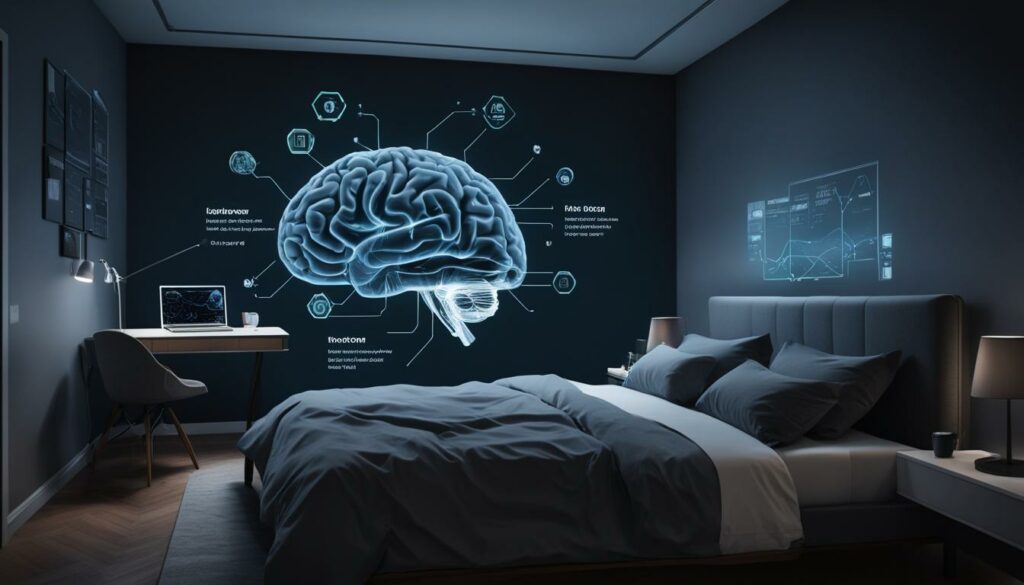Nocturnal erections, also known as sleep-related erections or night-time penile tumescence, are a common occurrence in men. These involuntary erections typically occur during the rapid eye movement (REM) phase of sleep and can last up to 30 minutes.
While the exact cause of these erections is not fully understood, they are believed to be influenced by both physiological and hormonal factors.
During REM sleep, the parasympathetic nervous system, responsible for pleasure and arousal, becomes more active. Additionally, testosterone levels tend to be highest in the morning, which may contribute to the frequency of nocturnal erections.
These sleep-related erections are not a sign of any underlying health issue and are considered a normal part of male sexual function.
Key Takeaways:
- Nocturnal erections, or sleep-related erections, occur during the REM phase of sleep.
- Physiological and hormonal factors influence the frequency of nocturnal erections.
- The parasympathetic nervous system and testosterone levels play a role in these erections.
- Nocturnal erections are a normal part of male sexual function and not a cause for concern.
- Understanding the factors that contribute to nocturnal erections can help identify potential causes of erectile dysfunction.
The Connection Between Sleep Erections and Erectile Dysfunction
Contrary to popular belief, there is no direct connection between sleep erections and erectile dysfunction (ED). However, the presence or absence of sleep erections can provide valuable information about the potential underlying causes of ED.
If a person with ED continues to experience sleep erections or morning wood despite their performance issues, it suggests that the cause of their erectile dysfunction is more likely due to psychological factors rather than physiological or hormonal factors.
On the other hand, a lack of sleep erections may indicate a problem on both psychological and physiological levels.
Understanding the cause of ED is important for determining the most appropriate treatment options, whether they be psychological interventions or medications like sildenafil (generic Viagra) or tadalafil (generic Cialis).
Physiological causes of erectile dysfunction:
Psychological causes of erectile dysfunction:
| Hormonal Causes | Physiological Causes | Psychological Causes |
|---|---|---|
| Hormone imbalances | Obesity | Stress and anxiety |
| Low testosterone levels | Diabetes | Depression |
| Thyroid disorders | Cardiovascular disease | Performance anxiety |
Psychological causes of erectile dysfunction can include stress, anxiety, depression, and performance anxiety. These factors can interfere with the brain’s signaling to the penis and disrupt the natural physiological processes that lead to erections.
Psychological counseling, cognitive-behavioral therapy, and relaxation techniques can be effective in addressing these underlying causes.
Treatment Options for Erectile Dysfunction
When it comes to treating erectile dysfunction, there are various options available, depending on the underlying cause and individual circumstances. Here are some common treatment approaches:
- Lifestyle changes: Making positive changes to your overall health can have a significant impact on erectile function. This includes maintaining a healthy weight, exercising regularly, managing stress levels, and avoiding smoking and excessive alcohol consumption.
- Psychological interventions: Counseling, therapy, and sex therapy can help address psychological factors contributing to erectile dysfunction. These interventions aim to improve communication, reduce anxiety, and enhance sexual confidence.
- Medications: Oral medications like sildenafil (generic Viagra), tadalafil (generic Cialis), and vardenafil (generic Levitra) are often prescribed to help improve erectile function. These drugs work by increasing blood flow to the penis, resulting in an erection when sexually stimulated.
- Vacuum erection devices: These devices create a vacuum around the penis, drawing blood into the penile tissues and causing an erection. A constriction ring is then placed at the base of the penis to maintain the erection. Vacuum erection devices are non-invasive and can be used as an alternative to medications.
- Penile injections: Medications can be injected directly into the penis to induce an erection. This method is effective for men who do not respond to oral medications but may require some training and practice.
- Surgical options: In certain cases, surgical intervention may be necessary to treat erectile dysfunction. This can include penile implants or vascular surgery to improve blood flow to the penis.
“It’s important to consult with a healthcare professional to determine the underlying cause of erectile dysfunction and to discuss the most appropriate treatment options.”
The Physiology of Nocturnal Erections
Nocturnal erections are believed to be triggered by a combination of physiological factors involving the brain, nervous system, and hormones.
During the rapid eye movement (REM) phase of sleep, specific areas of the brain responsible for stimulating the parasympathetic nerves and suppressing sympathetic nerves become activated.
As a result, the body shifts from the fight-or-flight response to the rest-and-digest response, leading to increased blood flow to the penis and engorgement of the corpora cavernosa, which are cylindrical structures within the penis that fill with blood during an erection.
Nitric oxide, released by nitrergic nerve fibers, plays a crucial role in the initiation and maintenance of these erections. Nitric oxide causes the smooth muscle cells in the blood vessels of the penis to relax, allowing for increased blood flow.
Androgens, such as testosterone, also play a significant part in the physiology of sleep-related erections. Testosterone levels tend to be highest in the morning, which may contribute to the frequency of nocturnal erections.
Some studies suggest that the presence of morning erections may have a positive impact on penile health by increasing oxygenation of the penile tissues.

Neurological Factors of Nocturnal Erections
The nervous system plays a crucial role. During REM sleep, certain neurotransmitter activities change, leading to a reduction in noradrenaline levels. Lower levels of noradrenaline, a neurotransmitter that typically inhibits erections, allow for the occurrence of nocturnal erections.
The Link Between Nocturnal Erections and Erectile Function
A growing body of research has demonstrated a strong relationship between nocturnal erections and overall erectile function. Nocturnal erections are considered a reliable physiological marker of penile health and vascular function.
When a person experiences regular sleep erections, it indicates healthy blood flow, nerve function, and overall well-being of the erectile tissues.
The absence of sleep erections, on the other hand, may suggest underlying issues that could contribute to erectile dysfunction.
By assessing the presence or absence of nocturnal erections, healthcare professionals can gain valuable insight into the potential causes of a person’s erectile difficulties, whether they are primarily psychological or physiological in nature.
The absence of sleep erections can be an informative sign that prompts further investigation into a person’s sexual health and potential underlying diseases affecting erectile function.
The Clinical Significance in Detecting Erectile Dysfunction
Nocturnal erections have clinical significance in identifying and diagnosing erectile dysfunction. By understanding a person’s sleep-related erectile activity, healthcare professionals can differentiate between psychological and physiological causes of erectile dysfunction, enabling them to recommend suitable treatment options.
Furthermore, the assessment of sleep erections can provide valuable information about the overall health of a person’s penile tissue, blood supply, and nerve function. It serves as an essential diagnostic tool, alerting healthcare professionals to potential issues and guiding treatment decisions.
The clinical significance of sleep erections lies in its ability to serve as a diagnostic marker for erectile dysfunction and underlying diseases affecting sexual function.
Conclusion
Nocturnal erections are a natural part of male sexual function and indicate the normalcy of erectile health. However, if you are facing difficulties with erections while awake, it is important to seek treatment for erectile dysfunction.
Both psychological and physiological factors can contribute to ED, and consulting with healthcare professionals can provide guidance on the appropriate treatment options.
Maintaining overall health is crucial for supporting erectile function. Leading a healthy lifestyle, including regular exercise, a balanced diet, and managing any underlying health conditions such as diabetes or cardiovascular disease, can help in maintaining healthy erections.
It is essential not to neglect the impact of mental health on erectile function, as conditions like severe depression can affect sleep erections.
Remember, seeking support and treatment for erectile dysfunction is important, and healthcare professionals are equipped to assist you. By addressing both the psychological and physiological aspects of ED and maintaining overall health, you can regain and preserve erectile function for a satisfying sex life.
FAQ
What are nocturnal erections?
Nocturnal erections, also known as sleep-related erections or night-time penile tumescence, are involuntary erections that occur during the rapid eye movement (REM) phase of sleep.
What causes nocturnal erections?
The exact cause of nocturnal erections is not fully understood, but they are believed to be influenced by both physiological and hormonal factors.
Is there a connection between sleep erections and erectile dysfunction (ED)?
No, there is no direct connection between sleep erections and erectile dysfunction. However, the presence or absence of sleep erections can provide valuable information about the potential underlying causes of ED.
How do nocturnal erections occur physiologically?
Nocturnal erections occur due to complex interactions between the brain, nervous system, and hormonal influences.
During REM sleep, specific areas of the brain responsible for stimulating the parasympathetic nerves and suppressing sympathetic nerves become more active, leading to increased blood flow to the penis and engorgement of the corpora cavernosa.
What factors affect the frequency and quality of nocturnal erections?
Several factors can influence the frequency and quality of nocturnal erections, including age and sleep quality. Underlying health conditions and certain medications may also play a role.
Do nocturnal erections have any clinical significance?
Yes, the absence of sleep erections can be a marker of certain diseases affecting erectile function, such as diabetes. It can also indicate a poor nerve or blood supply to the penis, leading to erectile dysfunction.




